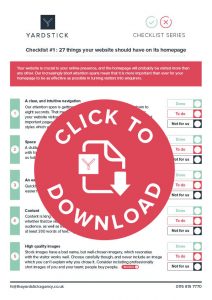Your website is crucial to your online presence, and your homepage will probably be visited more than any other. Our increasingly short attention spans mean that it is more important than ever for your homepage to be as effective as possible in turning visitors into enquirers.
Here’s our list of the 27 things that your website homepage should ideally include.
1. Clear and intuitive navigation
Our attention span is getting shorter. According to Microsoft, it’s now down to eight seconds! That means you need to make it as easy as possible for your website visitor to find what they need, and fast. Only include the most important pages in your navigation and avoid unusual, faddy, navigation styles which your target audience may not understand.
2. Space
A cluttered, busy, website will put your visitor off. A sense of space, coupled with foolproof navigation and relevant images, will put them at ease. It will also help them to find what they’re looking for.
3. An explanation of what you do, and who you do it for
Quickly make it obvious the types of clients you work with. That’ll make it easier for your visitor to find the information they need.
4. Content
Content is king. If you have engaging content on your homepage – whether that be video, text, imagery, or even audio – it engages your audience. Great content will also keep Google happy, which means including at least 300 words of text.
5. High quality images
Stock images have a bad name, but well-chosen imagery which resonates with the visitor works well. Choose carefully though, and if you include an image you should always be able to explain why you chose it. Consider including professionally shot images of you and your team; people buy people.
6. Calls to action
In terms of generating new clients your website has one job; to turn a visitor into an enquirer. So, you need to include prominent calls to action. Make it clear what your visitor should do, and how they should do it.
7. Your telephone numbers
Looking around a site trying to find a telephone number is infuriating. We’d always recommend including it in the top right-hand corner of your homepage and making it prominent when the page is viewed on mobile devices.
8. A second way to get in touch
A percentage of people will visit your website ‘out of hours’, while others might not feel comfortable using the telephone. You should always provide a way of getting in touch online; usually an email address or contact form.
9. Your logo
We process images more quickly than text. So, it’s vital that your visitor feels orientated by seeing your logo.
10. Brand consistency
If you have developed a specific colour palette for your brand, then ensure that you carry this through to your homepage. The same goes for fonts, imagery and the tone of voice that you use. Consistency creates familiarity and makes it easy for clients to spot you in a crowd.
11. Text in a suitably clear font
Your text needs to be easy to read online. That means choosing a clear font and displaying it in the correct size. We don’t all view websites on large screens so remember your mobile visitors.
12. Reasons to choose you
Again, your website needs to turn a visitor into an enquirer. To do this it needs to explain why they should choose to work with you. Make sure you explain this quickly (remember our short attention span!)
13. Your independent status
If you are an independent adviser, make this clear on your homepage. Some people say it makes no difference to whether a client chooses you or not. Others, including us, disagree. Including it can do no harm, only good – so add it in.
14. Video
Research shows that we spend 2.6 times more on a webpage that includes video. Combining this with our own research, we reckon that video could increase the time someone spends on the average adviser website by two and a half minutes. That’s an age in the online world.
15. Testimonials
Happy clients, saying nice things about you, will impress all but the most cynical of visitor. If the client will give you permission to publish their name and a photo, even better.
16. The page title and description suitably completed
The page title tells search engines what the page is about. The description tells potential website visitors what the page is about. It’s important that both are completed effectively. Simply Google your website to find out what the page title and description currently say.
17. A newsletter sign-up form
Assuming you send one (and we strongly recommend you do) your homepage should include a simple sign-up form. And, don’t forget to display a ‘thank you’ message when someone signs up.
18. News and blog articles
Displaying useful and relevant content on your homepage shows your visitor the type of work you do and adds value. It also positions you as an expert.
19. Social media links
Social media can be a great way of interacting with potential clients. If you use it as part of your marketing strategy it makes sense to add the links to your homepage.
20. Your full contact details
A summary of your contact details (telephone number, address, email, etc.) should be displayed somewhere on the homepage; probably in the footer.
21. Regulatory and statutory wording
This is a simple must have, yet we see many advisers still missing it off their sites.
22. Chartered status
If your firm holds Chartered status, or you do and you are the sole adviser in your business, make it clear on your homepage that you have attained that level of qualification. And, more importantly, explain how it benefits your clients. You didn’t work hard to achieve it just so that you could hide it away in the footer, as so many advisers do.
23. Awards
If you or your firm has won awards, display the logo on your homepage. Add a link to another page which explains how and why you won the award.
24. VouchedFor rating
If you are ‘highly rated’ include it by embedding the code VouchedFor give you. If that doesn’t look right on your site, use an image of your rating.
25. Client login
You may offer your clients online access to their investments. If this is the case, offering them easy access to the portal via your homepage gives them a reason to keep coming back.
26. Guides
Giving away relevant, useful and informative content in the form of guides is proven to work. If you are following this strategy, make the content easily accessible from your homepage.
27. Keywords
There will be certain keywords and phrases you would ideally like Google to rank your website for. These should be included within the headlines, copy, and as ‘alt descriptions’ to your images on your website homepage.
How did you do?
If you’ve got more boxes ticked for ‘done’ than ‘need to do’ then congratulations! Your homepage will no doubt be a great place for your audience to visit.
If you have the odd ‘need to do’ ticked that you’d like to talk about, then we’d be happy to help out.
You can reach us by email at hi@theyardstickagency.co.uk or by calling 0115 815 7770.




